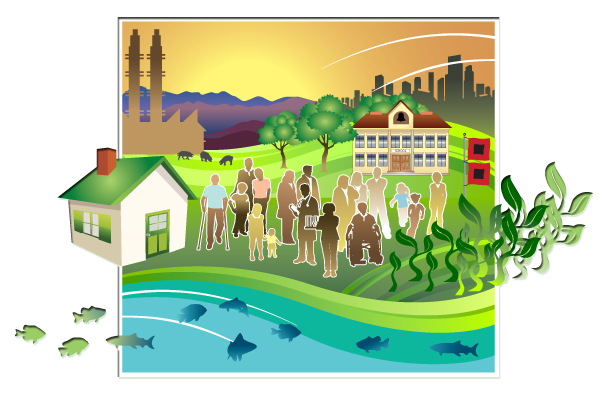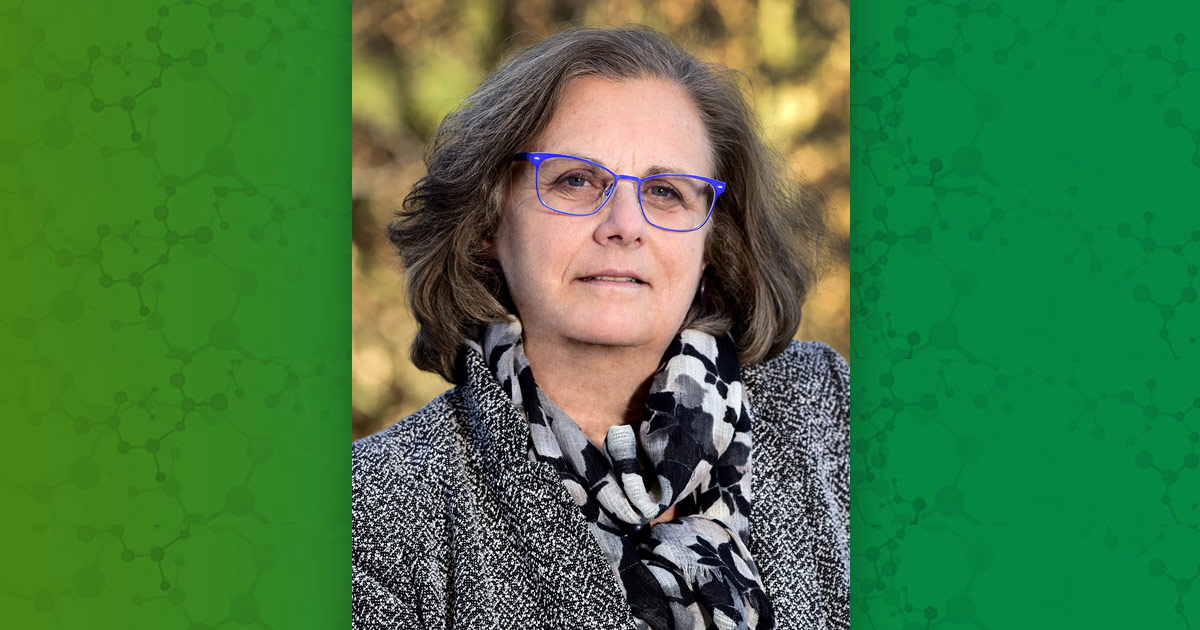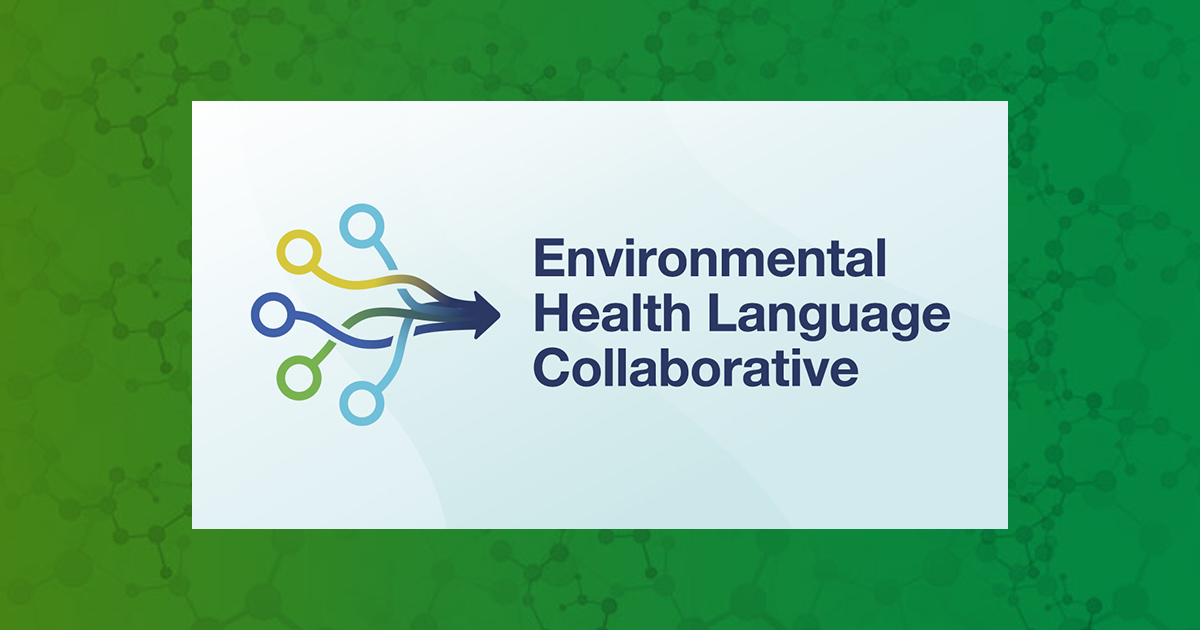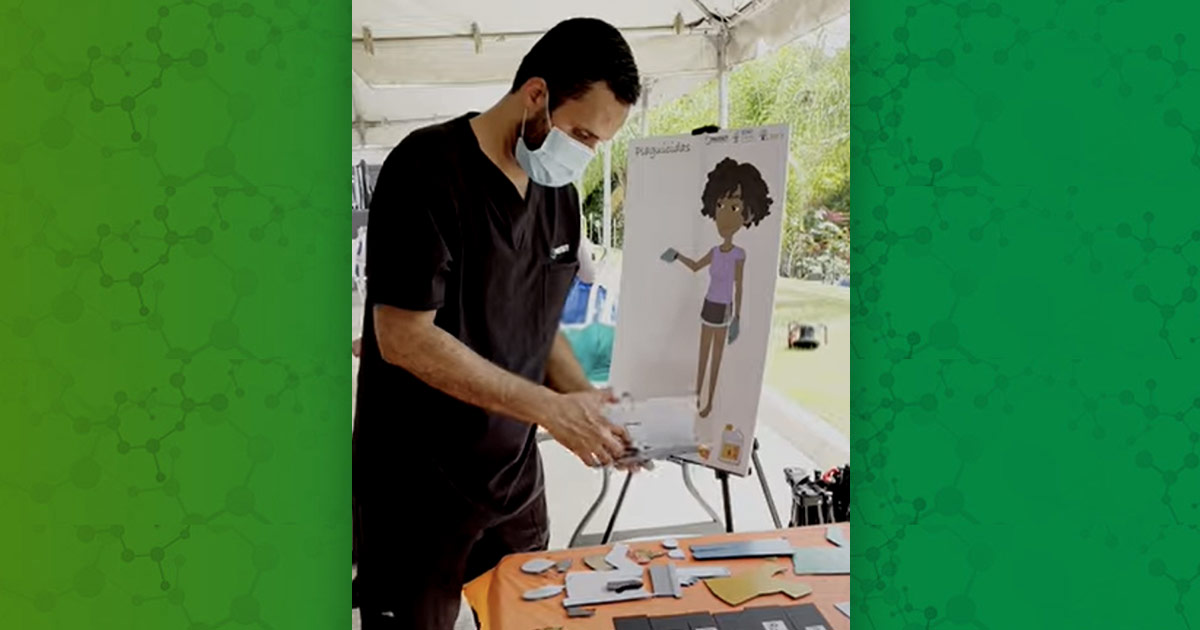Documentary Film Features Research and Advocacy for Domestic Worker Health and Safety
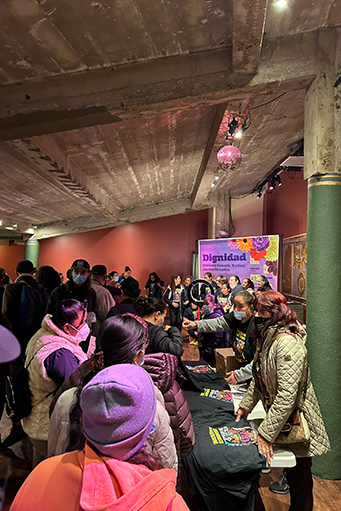
Members of the California Domestic Workers Coalition speak with attendees at a recent screening of Dignidad. (Photo courtesy of Jose L. Lopez Garcia, UC Davis Research Associate)
The NIEHS-funded Environmental Health Sciences Core Center at the University of California (UC) Davis released a documentary in January 2023 that describes workers’ quest to improve their health and safety within the household domestic service industry in California. The documentary,"Dignidad: Domestic Workers’ Journey for Justice in California,” features results from a report that describes how the COVID-19 pandemic affected these workers.
The report was based on results from a survey, which was developed and administered as a collaboration between the California Domestic Workers Coalition and the UC Davis team. The survey was tailored for domestic workers to better understand working conditions and the impact the pandemic had on them. The coalition then used the research results to support policy change that would better protect domestic workers.
“While environmental health research results can help community members better understand their health risks, using the data to do something about the risks is key to reducing environmental and occupational health burdens,” reflected Irva Hertz-Picciotto, Ph.D., principal investigator of the study and executive director of the documentary. “The California Domestic Workers Coalition has been advocating for several years for policy change that would provide domestic workers with the protections enjoyed by most other workers. In September 2021, they finally were able to move the dial in the right direction. We are proud to share this story through Dignidad.”
Addressing Workplace Protections for Domestic Workers
Rules provided by California’s Occupational Health and Safety Act (Cal/OSHA) protect workers from conditions that may cause harm to their health and safety; however, domestic workers, which include nannies, house cleaners, and home attendants, who are employed in a home setting are not included. During the COVID-19 pandemic, workplace protections included employer-provided masks, enforcement of social distancing, and information on the risks of catching COVID, but domestic workers employed by households were often without these protections.
To learn more about work conditions, the researchers surveyed 164 domestic workers, of whom 95% were women and 82% Hispanic, reflecting demographics consistent with those of the overall domestic worker workforce across the United States.
The survey was conducted before the release of the first COVID-19 vaccine. Practices such as wearing a mask, social distancing, and keeping away from sick individuals were, at the time, the best means of preventing infection and illness.
Researchers concluded from survey data that domestic workers had three times the risk of having COVID-19 compared to the general California population, and approximately one-third believed they caught COVID at work. Responses also indicated household employers were not enforcing COVID-19 guidelines. When asked whether masks were provided by their employers, 77% of workers stated they were not provided with a mask. Further, 75% of survey respondents stated that their employers did not provide information about COVID risks, such as entering the home of a client known to be COVID-positive. Additionally, 59% of employers did not enforce social distancing.
“As a result of exclusion from Cal/OSHA, a workforce that is mostly made up of immigrants and women of color did not have protective equipment, training, or information about risks at work, during the height of a global pandemic,” said Kimberly Alvarenga, Director of the California Domestic Workers Coalition. "We are thankful for the partnership with UC Davis to conduct this research to shine a light on the impacts of this historic exclusion and to help bolster our efforts to get the protections this essential workforce needs.”
Hertz-Picciotto added, “Results from our research confirmed many of the domestic workers’ concerns about the lack of measures taken to protect them at their workplaces during the COVID-19 pandemic. The results helped them advocate for greater workplace protections.”
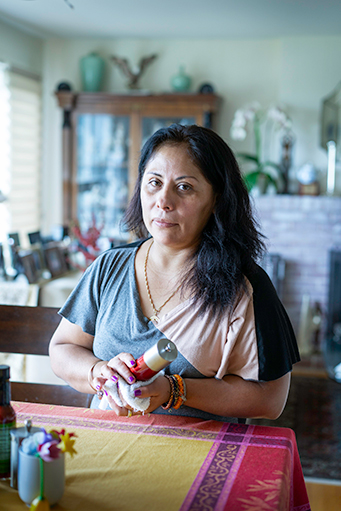
A member of the California Domestic Workers Coalition at work in a client’s home. (Photo courtesy of Megan Whelan)
Telling the Story of Worker Health and Safety Advocacy Through Film
The UC Davis team documented both the workers’ stories about COVID-19 in the workplace and the California Domestic Workers Coalition’s efforts to advocate for protections. Hertz-Picciotto also appears in the film to describe the UC Davis team’s role, and the importance of worker health and safety.
“Making a film is one of the best ways to engage a broad public,” stated Hertz-Picciotto. “The domestic workers and their needs are the focus of the research, and the day-to-day realities of their lives are front and center in the film.”
Dignidad features several domestic workers who tell their stories. In one example, a home attendant for the elderly and disabled describes his passion for his work, but also reflects on how he struggled in dealing with a lack of protections from COVID-19. He believes his hospitalization with COVID-19 was a result of infection on the job. He is now an advocate for the Pilipino Workers Center, which works to ensure the safety of the Filipino community and supports the domestic worker industry in southern California.
The documentary also traces the story of advocates’ ongoing efforts to receive protections for domestic workers under Cal/OSHA.
In 2021, California amended Cal/OSHA policies to create voluntary guidelines for employers, including provisions to ensure domestic worker safety. These guidelines were developed by an advisory committee that included domestic workers and employers, but workers in household settings still do not benefit from the full protection of Cal/OSHA regulations.
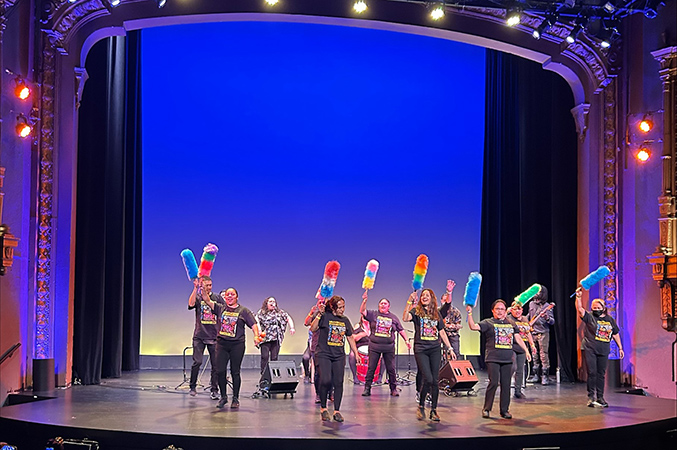
Members of the California Domestic Workers Coalition join the stage after a recent screening of Dignidad. (Photo courtesy of Jose L. Lopez Garcia, UC Davis Research Associate)
Megan Whelan, Associate Director of the California Domestic Workers Coalition, added: “These new guidelines are a critical first step to providing workers who are central to our economy with the health and safety protections they deserve in their workplaces.”
PEPH Evaluation Metrics Training Videos Now Available
The NIEHS Partnerships for Environmental Public Health (PEPH) posted a series of training videos on logic models and evaluation metrics, recorded during a November 2022 meeting. The videos complement the PEPH Evaluation Metrics Manual, which is meant to be used by PEPH grantees during both project planning and project evaluation phases. In the training videos, NIEHS program officers and staff provide guidance on metrics related to:
The trainings operationalize guidance provided in the Evaluation Metrics Manual, with NIEHS staff facilitators walking through examples and answering meeting attendee questions. PEPH grantees are encouraged to review the trainings to plan evaluation and project efforts. Any questions about PEPH evaluation metrics or logic models can be directed to [email protected].
Request for Information on U.S. Environmental Protection Agency’s Climate Justice Program
The U.S. Environmental Protection Agency (EPA) released a request for information on its new Environmental and Climate Justice (ECJ) Program. Under the Inflation Reduction Act, the EPA received $3 billion to fund their ECJ Program. The resulting grants and technical assistance offerings will benefit communities experiencing excess environmental burdens by providing funding for environmental and climate justice work. The EPA is particularly looking for input on strategies for innovative funding mechanisms and activities in areas such as competition design; community engagement; equitable distribution of financial resources; grantee eligibility for funding, capacity-building, and outreach; and technical assistance. The public is invited to comment on:
Associations, governmental and non-governmental organizations, nonprofit and community-based organizations, American Indians and Alaska Native Tribes and Tribal organizations, and others are encouraged to apply. Comments are due March 17 on regulations.gov.
Employment Quality Study Leads to Resources for Housecleaners
A team of NIEHS-funded researchers and community partners published a paper in November 2022 detailing their survey-based findings on the link between employment quality and mental and self-reported health outcomes among Latinx housecleaners. To create the survey, the team used a framework that characterizes employment quality along dimensions such as employment stability; the degree of workers’ rights to social protections; healthy, predictable work hours; and balanced interpersonal power relations. In addition to questions on employment quality, the survey also had questions on housecleaners’ depression, perceived stress, self-reported health, and irritant-related symptoms related to chemical exposure. The researchers found that unbalanced interpersonal relations, low earnings, and workers’ rights violations were associated with increased risk of depression, perceived stress, and self-reported poor health. Additionally, irritant-related symptoms, such as shortness of breath and eye irritation, were associated with self-reported poor health. In conducting the research, the team prioritized generating actionable results. They created the Super Cleaners group to provide legal and other resources for housecleaners and a workplace safety and health training for housecleaners.
Quality Assurance Toolkit Helps Organizations Ensure Data Quality in Participatory Science
Quality assurance during data collection helps ensure data generated by the public in participatory science projects can have meaningful impact. The U.S. Environmental Protection Agency published a Quality Assurance Toolkit to help groups that are planning such projects. The toolkit has three parts:
The materials are useful for projects aimed at increasing public understanding, scientific research, and legal and policy action. The handbook, with its accompanying worksheets and examples of quality assurance documentation, is meant to help organizations complete a quality assurance project plan.
Special Journal Collection Highlights Community-Engaged Research
The International Journal of Environmental Research and Public Health has a special journal collection, Community-Engaged Research to Promote Environmental Health, Sustainability, and Community Resilience, which was released in late 2020. The issue, co-edited by Sacoby Wilson, Ph.D., M.S., and Al Richmond, M.S.W., includes publications that address environmental injustices, a community’s built environment, and community resiliency, among other topics. The collection is an excellent resource for community-engaged research practitioners. The issue features work conducted by several NIEHS-funded researchers, including work on community planning to increase flood resilience (Jennifer Horney, Ph.D., MPH), climate resiliency in Detroit (Marie S. O’Neill, Ph.D.), youth environmental health literacy (Paul English, Ph.D., MPH), and community-engaged research in context (Jonathan London, Ph.D.).

PEPH Environmental Health Chat Podcast Series
Reducing Exposure to Disinfection Byproducts in Drinking Water
PEPH Environmental Health Chat Podcast Series
Reducing Exposure to Disinfection Byproducts in Drinking Water
Before drinking water reaches our taps, it is treated with chlorine to kill germs that can cause disease. This disinfection step may create disinfection byproducts that are linked to risks to human health. Anna Goodman Hoover, Ph.D., a public health researcher at the University of Kentucky, and Nina McCoy, of Martin County Concerned Citizens, work with residents in rural Kentucky who are concerned about their drinking water. Hoover and McCoy discuss an NIEHS-funded community-engaged project to raise local awareness of and reduce exposure to these compounds.

PEPH Grantee Highlight
Kevin Lane, Ph.D.
As an assistant professor at Boston University, Kevin Lane, Ph.D., studies the effects of air pollution and the built environment on human health in the U.S. and abroad. His research often entails using geographic information systems and computer modeling to visualize relationships between populations and exposure data. Among his various activities, Lane contributes to the Assessment of Freeway Exposure and Health Study, or CAFEH, an NIEHS-funded project he first worked on as a trainee. Over the past few years, he has widened his focus from road traffic to air travel, exploring how aviation contributes to ultrafine particulate pollution. You can read more about the CAFEH project in the July 2021 PEPH newsletter feature.
Funding Opportunities
Implementation Research on Noncommunicable Disease Risk Factors among Low- and Middle-Income Country and Tribal Populations Living in City Environments (R01 Clinical Trial Optional)
Supports applications that propose implementation research to reduce the risks of noncommunicable diseases in the context of cities in low- and middle-income countries and/or among American Indian/Alaska Native populations in US cities, with the potential to equip policymakers and practitioners with evidence-based strategies for prevention and/or management of noncommunicable diseases among disadvantaged populations globally. NIEHS is interested in applications that are within scope of our 2018-2023 Strategic Plan, and focus on implementation research in partnership with LMIC and AI/AN populations that addresses environmental noncommunicable disease risk factors (e.g., air pollution, disaster risks attributed to climate change, etc.) in one or more city/ies. Specific areas of interest to NIEHS include, but are not limited to: implementation research focused on the uptake, scale-up and spread of multi-level and/or multi-sectoral interventions to reduce noncommunicable disease risks attributed to physical and built environmental exposures in cities; implementation research focused on how to improve the adaptive capacity of cities in the face of climate change and climate change related disasters; and implementation of interventions to reduce environmental NCD risks that consider social and structural social determinants of health.
Deadline: March 9, 2023
Time-Sensitive Research Opportunities in Environmental Health Sciences (R21 Clinical Trial Not Allowed)
Supports research in environmental health science in which an event has or will imminently occur that provides a limited window of opportunity to collect samples and data to support the assessment of exposures and human health impact. The goal of the program is to characterize initial exposures, collect human biological samples, or collect human health and exposure data in order to provide critical information to understand exposure-health outcome relationships, with the goal of providing data that will facilitate timely action to protect public health. The program also supports the use of innovative techniques (hazard identification, sensing and mitigation technologies) that are uniquely valuable for deployment at a time of disaster to inform our understanding of the human health impacts of the disaster.
Deadlines: April 3, 2023; June 1, 2023
PHS 2022-2 Omnibus Solicitation of the NIH, CDC, and FDA for Small Business Innovation Research Grant Applications (Parent SBIR [R43/R44] Clinical Trial Not Allowed)
Enables U.S. owned-and-operated small businesses to conduct research and development that has a strong potential for commercialization. This award and the associated PHS 2022-2 Omnibus Solicitation of the NIH and CDC for Small Business Innovation Research Grant Applications (Parent SBIR [R43/R44] Clinical Trial Required) provide funds for small businesses to stimulate technological innovation in the private sector and strengthen the role of small business in meeting federal research and development needs. The related Small Business Technology Transfer announcements [PHS 2022-2 Omnibus Solicitation of the NIH for Small Business Technology Transfer Grant Applications (Parent STTR [R41/R42] Clinical Trial Not Allowed) and PHS 2022-2 Omnibus Solicitation of the NIH for Small Business Technology Transfer Grant Applications (Parent STTR [R41/R42] Clinical Trial Required)] aim to foster technology transfer through cooperative research and development between small businesses and research institutions.
Deadlines: January 5, 2023; April 5, 2023
Environmental Protection Agency (EPA) Environmental Justice Collaborative Problem-Solving Program (EJCPS) Cooperative Agreements
EPA’s EJCPS Cooperative Agreement Program provides financial assistance to eligible organizations working on or planning to work on projects to address local environmental and/or public health issues in their communities. The program assists recipients in building collaborative partnerships with other stakeholders (e.g., local businesses and industry, local government, medical service providers, academia, etc.) to develop solutions that will significantly address environmental and/or public health issues at the local level. Special consideration will be given to the following focus areas:
Deadline: April 10, 2023
Environmental Protection Agency (EPA) Environmental Justice Government-to-Government Program (EJG2G)
The EJG2G Program works to support and/or create model state activities that lead to measurable environmental or public health results in communities disproportionately burdened by environmental harms and risks. These models should leverage or utilize existing resources or assets of state agencies to develop key tools and processes that integrate environmental justice considerations into state governments and government programs. Special consideration will be given to the following focus areas:
Deadline: April 10, 2023
Environmental Health Sciences Core Centers (EHSCC) (P30 Clinical Trial Optional)
Invites grant applications for Environmental Health Sciences Core Centers (EHS CC). As intellectual hubs for environmental health science research, the EHS CC is expected to be the thought leaders for the field and advance the goals of the NIEHS Strategic Plan. The Core Centers provide critical research infrastructure, shared facilities, services and/or resources, to groups of investigators conducting environmental health sciences research. The structure of the Center should facilitate multi-directional interaction with communities and EHS CC members through the required Community Engagement Core (CEC). In addition, EHS Cores are expected to attract established and promising investigators into environmental health research and provide opportunities for career enhancement. Finally, this FOA requires a Plan for Enhancing Diverse Perspectives as part of the application. NIEHS will hold an informational webinar/Q&A session Friday January 20, 2023, from 1:00 – 3:00 p.m. EDT. Registration is available.
Deadline: April 19, 2023
Ruth L. Kirschstein National Research Service Award (NRSA) Institutional Research Training Grant (Parent T32)
Supports development of and/or enhances research training opportunities for individuals interested in careers in biomedical, behavioral or social sciences, clinical research, health services research, or in any other research discipline related to the NIH mission. The NIH Ruth L. Kirschstein National Research Service Award (NRSA) program helps ensure a diverse pool of highly trained scientists is available in appropriate scientific disciplines to address the nation's biomedical, behavioral, and clinical research needs. To accomplish this goal, NRSA training programs are designed to train individuals to conduct research and to prepare for research careers. More information about NRSA programs may be found at the Ruth L. Kirschstein National Research Service Award (NRSA) website.
Deadlines: May 25, 2023; September 25, 2023
Ruth L. Kirschstein National Research Service Award (NRSA) Short-Term Institutional Research Training Grant (Parent T35)
Provides short-term support for a period of at least 8, but no more than 12, weeks in a grant year for full-time training experiences under the supervision of experienced researchers. Supports training opportunities for predoctoral students interested in careers in biomedical, behavioral, or clinical research. This program is also intended to encourage training of graduate students in the physical or quantitative sciences to pursue research careers by short-term exposure to, and involvement in, the health-related sciences. The training should be of sufficient depth to enable the trainees, upon completion of the program, to have a thorough exposure to the principles underlying the conduct of biomedical research.
Deadline: May 25, 2023
Notice of Intent to Publish a Funding Opportunity Announcement for Reporting Back Environmental Health and Non-Genomic Research Results
NIEHS, in partnership with the NIH Office of Science Policy (OSP) and the All of Us Research Program, intends to publish a FOA for applications that identify, develop, and test strategies for reporting back environmental health and non-genomic research results to study participants and/or key partners. Applications will be sought that advance the field of reporting back of research results (RBRR) for environmental health and non-genomic research results to help establish best practices/guidelines through research and evaluation; improve understanding of perceived risks and benefits, challenges, and obstacles to inform the practice of RBRR; and better understand how RBRR can help improve health equity and reduce health disparities. Potential applicants are highly encouraged to contact Liam O'Fallon at NIEHS. The estimated date of publication of this FOA is April 3, 2023.
Deadline: June 5, 2023
Research to Action: Assessing and Addressing Community Exposures to Environmental Contaminants (R01 Clinical Trial Optional)
Encourages multidisciplinary projects to investigate the potential health risks of environmental exposures of concern to a community and to implement an environmental public health action plan based on research findings. Projects supported under this program are expected to employ community-engaged research methods to not only conduct research but also to seamlessly translate research findings into public health action. Check out the Research to Action Currently Funded Grantees webpage for a sense of the types of projects supported through this FOA.
Deadline: January 21, 2020




